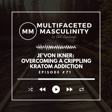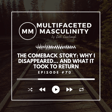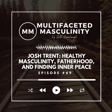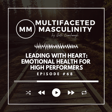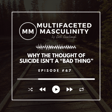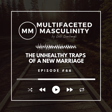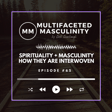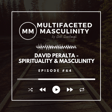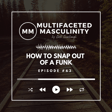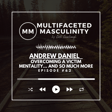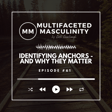Become a Creator today!Start creating today - Share your story with the world!
Start for free
00:00:00
00:00:01

What the Hell are Positive Triggers & Why do They Matter? | Ep. #15
When people talk about getting "triggered" it's almost always a negative thing. The problem is, when you only see triggers as a negative then you inadvertently go out of your way to either try to manage or avoid them. A big factor in changing your relationship to triggers is understanding there are both negative and positive ones in the first place. Today we dive into the positive side of things and give practical ways to integrate them into your life.
URL's
Host: JoshCearbaugh.com
Podcast: MultifacetedMasculinity.com
12 Week Course: Jumpstartyourlife.com
Free 15 Minute Consultation: Click Here
Transcript
Exploring Masculinity: Depth and Emotions
00:00:00
Speaker
Men, we are not simple, chest-thumping, rock-smashing, fire-starting barbarians. We have depth. We intensely feel. We are scared, yet brave. We love to have fun. We're imperfect and make mistakes. We're compassionate and loving. We are multifaceted. Let's explore the reality of masculinity together.
Building a Foundation of Positivity
00:00:28
Speaker
Welcome to multifaceted masculinity.
00:00:32
Speaker
Today's topic, I'm actually really excited about for a lot of reasons with all the negativity going on in the world with COVID and politics in the US right now and riots. And I just read that there is a dust storm that's supposed to come and hit us. And who knows what else is in store that it would be good to talk about something positive and not just, Hey, you need to smile more or be grateful, but really something foundational that can help shift your inner world.
00:01:00
Speaker
to begin to connect to the positives in life and let it spill out into so many other areas.
Balancing Positivity and Negativity in Depression
00:01:06
Speaker
As somebody who has struggled with depression, I have to be really intentional with having a healthy balance or relationship with the positive as well as validating the negative. It's really easy to get skewed and only be able to identify and focus on the negative. So today's topic is all about how to have that healthy balance.
00:01:30
Speaker
But before we dive in, if you haven't subscribed yet, pause the episode right now and go do that. That way you don't miss any further episodes. All right, let's go ahead and dive into positive triggers.
00:01:56
Speaker
For today's episode, we are going to be breaking this down into really three sections. And you can check out the transcription on multifaceted masculinity if you want to jump to one of the sections. But first, we're going to dive into why positive triggers matter. For me, understanding the why behind something really helps me engage in the process that may be required to change an internal paradigm.
00:02:19
Speaker
So that's the first thing we're going to do. Then we're going to begin to unpack what that does for your heart. So great, it matters. But then what does that do to you or for you when you begin to engage in the positive triggers? And then lastly, we're going to dive into a couple really practical ways that you can look for, identify and start to engage with these positive triggers.
00:02:42
Speaker
So let's start with why it matters. Why do positive triggers matter? What's the big deal about positive triggers? Well, I don't know about you, but for me, it wasn't until I was in my late twenties that I even heard the idea of positive triggers. And like I've said in previous episodes, I have been pursuing personal development, emotional health, whatever you want to call it in the vein of just becoming a better person really since I was a teenager.
00:03:07
Speaker
What I found is that when you talk about triggers, most people immediately associate it with negative triggers. They essentially have only heard about, well, if I'm triggered, you know, then that means I'm in the middle of an argument and I am irate and I'm not thinking straight and I'm going totally out of fight or flight because I'm triggered. And so you learn how to identify those negative triggers and learn how to respond to them and manage them and reduce them, et cetera.
00:03:33
Speaker
And I'm not saying that any of that is bad. I think all of that is good. It's something I incorporate in my own
Identifying and Balancing Emotional Triggers
00:03:39
Speaker
life. But when you only identify the negative of something, then what happens is you inadvertently begin to remove gratitude from your life. What happens is when you become an expert at the negative triggers, then you come into any situation perceiving things with the wrong lens or wrong expectation.
00:03:57
Speaker
Or maybe you turn yourself into a project that needs fixing. Rather than enjoying life and understanding that you are an individual that has both the positive and the negative, how to identify and approach both of those should be equally as important. Or even dare I say, the balance should actually be a little bit more on the positive. I'm not saying to not validate the negative, but even if you have a 50-50,
00:04:21
Speaker
on emotional bandwidth focused on managing your negative triggers versus managing or identifying and leaning into your positive triggers, then what you're doing is you're basically trying to run in life with ankle weights on. And so that's why I say it's a really important topic or a really big deal.
00:04:38
Speaker
Like I said in the intro, I've struggled with depression over the years. And from a neurological standpoint, it's been well-documented that people with depression tend to go into a situation and they can identify the negative. If you're depressed and you go to a party, let's say,
00:04:54
Speaker
you actually enjoy the evening overall but then let's say somebody gave you a glaring look or some somebody said something negative to you or you got tired and got a headache then if you are depressed or someone who has only worked on the negative side of things it's really easy for you to leave that party and just all you think about is the headache or all you think about is the glare from the other individual
00:05:17
Speaker
and depression is a really broad topic we're not getting into that but that's just an example of how only focusing on the negative can begin to skew your lens on life similar to the way that depression does where just like an individual with depression that goes to a party
00:05:33
Speaker
they leave and they really only identify or remember the negative moment rather than the fact that most of the evening was really good. The same thing can come true with your own internal lens and how you perceive yourself and see yourself.
Personal Development Through Emotional Balance
00:05:47
Speaker
If you're somebody who has been pursuing personal development,
00:05:50
Speaker
for a month or a year or 10 years or 20 years, if you've only incorporated the negative triggers or being triggered as a negative thing, then you're doing the exact same thing that maybe that depressed person does when they leave a party, is you're really good at identifying those negative things to work on.
00:06:08
Speaker
And I became a master at it. I could very easily tell you what my insecurities were or my shortcomings or the ways that I feel like a fraud in certain things. Like I could find the negative really easily. But in doing that, I handicapped the ability to be able to identify and connect to the good.
00:06:28
Speaker
And over time, your heart becomes exhausted at being the project that needs worked on or this thing that's broken that needs fixed. And so when you start to lean into positive triggers, what it does for your heart is when you shift that heart posture, it really helps prevent bitterness from coming in, not just at other people, really at yourself and your lens on the reality of life. So let me give you an example of what I'm talking about.
00:06:55
Speaker
let's say that you had a less than stellar childhood and your parents weren't amazing or maybe you had a parent that wasn't present or was present physically but not emotionally whatever it is that you may have struggled with and now you're an adult and you're beginning to pursue
00:07:10
Speaker
emotional health and you're putting most of your attention and effort on the fact that you had a bad childhood or a negative childhood. Again, I'm not saying to devaluate that process. I think it's really important. And I think especially for us guys, most of us run away from being brutally honest with that side of our heart. But if you only focus on the negative, then you actually become resentful towards your childhood or resentful towards your parents.
00:07:37
Speaker
And when you identify positive triggers, it helps you find the good elements in that same childhood and really begins to broaden your perspective to the reality of what you experienced. So let me give you an example from my own life. Part of my healing journey has been connected to the relationship with my dad. And when I was processing through ways that I felt like he didn't show up or didn't teach me certain things when it came to processing emotions,
00:08:06
Speaker
That's really all that I was focused on. And I didn't really begin to hate my dad, but I did begin to resent him or feel negative towards him. But when I chose to broaden my perspective and change my heart posture to begin to explore this thing of positive triggers.
00:08:25
Speaker
What it did is it opened up my heart's ability to identify the good that came from my relationship with my dad. So I wrote down the good things that happened. But I can honestly say that my heart would not have been in the right place or even been capable of doing that had I not chosen to begin to balance
00:08:48
Speaker
the negative trigger or managing the negative trigger with the positive triggers. And just like anything else, our goal is to learn how to manage things in a well-rounded way. I mean, a man who brings stability and confidence and security to his environment
00:09:08
Speaker
is able to take a variety of things in his life and find a healthy balance or a middle ground to walk that creates that stability so when you become open to the positive then what you're doing is you're internally beginning to create a ballast internally emotionally because you're maintaining a heart posture
00:09:33
Speaker
where you are identifying and validating the negative triggers and learning how to process through them and respond to them differently, but you're also learning how to identify and lean into the positive triggers. So when you do all of this, you not only become well-rounded or grounded as a man, but positive triggers specifically, they can begin to uncover passions that may have fallen dormant.
00:10:02
Speaker
It's a similar concept of play to your strengths. Now, I disagree with people that say ignore your weaknesses and only lean into your strengths. I think it's really important, yes, to play into your strengths, but also be willing to be honest with your weaknesses.
Uncovering Passions with Positive Triggers
00:10:16
Speaker
The reason that it begins to help you discover your passions
00:10:20
Speaker
Is because a lot of us when we have experienced disappointments or regret or pain that's really where are negative triggers begin and so we learn how to just focus on the disappointment or the regret or the pain.
00:10:37
Speaker
And we learn how to respond to that rather than learn how to identify the good that came from certain situations that may have been negative, or even certain ways that we had good moments, maybe in a time where it was really negative overall, but we never identified those positive moments.
00:10:57
Speaker
Okay, now that we've laid a little bit of a foundation, let's dive into some really practical ways of how to find a positive trigger and really what to do with it once you find it. A really great starting point is similar to a negative trigger. Look for those moments when you're feeling the opposite of what a negative trigger is, right? What's a negative trigger?
00:11:20
Speaker
It's when I'm irrationally angry or feel out of control or lost or confused or whatever it may be that has me reacting in a way that is divorced from my true identity. Well, a positive figure, you begin to look for moments that you feel at peace or you feel refreshed or calm or loved. The positive side of things
00:11:48
Speaker
Believe it or not, you have those throughout the day if you're willing to begin to pause, identify them, and lean into them. Now, the next step, once you've identified that, really helps if you have been willing to either meet with someone or work with a counselor or a life coach or whatever it may be to begin to work on either the negative or the positive.
00:12:12
Speaker
If you have, then similar to a negative, then what you're gonna do is let's use really at peace. Well, once you've identified that, then you trace that theme back to the earliest memory that you had that feeling. And when you're at that moment in your past, what stood out in that moment? What really grabbed your attention that made that moment so positive and something that your heart is actually connecting to?
00:12:40
Speaker
I'm going to give you an example, but once you've identified what that is, what stood out to you, then you begin to incorporate that into your present life. So let me give you that example out of my own life. Old wood is an incredibly positive trigger for me. And once I realized that, like I would walk into different stores or antique shops or different homes that were decorated with old wood.
00:13:07
Speaker
and I would find myself distracted by how good it felt to be in that room. Once I identified that I was feeling such a positive response to Old Wood,
00:13:19
Speaker
I asked myself a really simple question. Why is it that I'm so drawn to old wood? And what is it about old wood that makes my heart feel at peace? And doing that led me to my grandpa's farm. My grandpa, he's got about 400 acres in Illinois that he farms.
00:13:38
Speaker
And every year when i was a kid we would head out to the farm and we would play around in the barns and my grandpa is a sixth generation farmer and so there was the tools that were needed for harvesting and managing the land but then there was also these really old barns.
00:13:57
Speaker
And there was this really cool area where all the hay bales were stored and we would build forts and pass through it and everything. I realized that out of my childhood, going to my grandpa's farm, that was some of the most positive memories that I had as a kid. And so what I did with that was I began to incorporate old wood in my home.
00:14:20
Speaker
We literally found things that had old wood and made it part of my decorations. Or there's times where I've intentionally visited old farms or go to farmer's markets or bring my kids to places that have old wood. Why do I do that? Well, because I'm actually positioning my heart to be exposed to the positive trigger.
00:14:41
Speaker
And having that helps me balance internally the positive with the negative aspects of my childhood. And if you're able to, I would highly recommend finding a way to incorporate it into your home because we manage an internal world, whether we realize it or not. And a lot of times our settings or our environment externally is a reflection of how we're feeling internally. So that's why once I realized it was old wood, I've intentionally added that to my decorations.
00:15:09
Speaker
because I want to intentionally expose my heart to that positive trigger on a regular basis. Now if you have kids you can actually pass along these positive triggers to your kids. I just got back from an exhausting but very fulfilling trip with my kids where we actually drove through 15 states in 12 days over 3,600 miles
00:15:33
Speaker
I was the only one that did the driving and my body was shot when I got back, but my heart was so full because one of the places that we went was my grandpa's farm. And for two out of three of my kids, that was the first time meeting their great grandpa. And I had told them stories about the farm and they knew about Old Wood and why I liked it. And we created a memory as well as an experience connected to the Old Wood
00:16:01
Speaker
by going to Great Grandpa's farm and to Great Great Grandpa's farm. And so you can only imagine how full my heart felt by seeing my kids having so much fun and joy connected to something that brought me so much joy as a kid.
00:16:20
Speaker
everything from the old wood to the smells in the barn which some people might think is gross but it brought back that positive trigger of all the great memories i have my grandpa has a great big john deere tractor which i got to drive my kids in and let them drive the john deere tractor etc and so i was experiencing the positive triggers
00:16:45
Speaker
but I was also passing those positive triggers along to my children, which they're learning to expose their own hearts by experience. And when they get older, it may be old wood, it may not be, but I'm creating a positive association with the things that created positive triggers for me.
00:17:02
Speaker
So you can actually pass those along to your kids.
Balanced Masculinity Through Emotional Awareness
00:17:05
Speaker
So my point in all of this is it's important to become just as much of an expert at identifying and leaning into and incorporating the positive triggers as you do in learning how to manage the negative triggers that you may have or get healing from the negative triggers that you may have.
00:17:24
Speaker
there is a way for you to be a well-grounded, balanced, safe man. And a big part of that is being willing and able to have an internal balance of both the positive and the negative.
00:17:39
Speaker
Now, if you found this podcast helpful or any other one that you've listened to, I do have an ask and that is to just pass it along to somebody you think may benefit from it or even leave a review. I read all of them and they mean so much to me. My heart is to help men learn and lean into healthy masculinity.
00:18:03
Speaker
and spreading the word, spreading the podcast, writing a review. Those are really the best things that you can do to help this movement for healthy masculinity.
Community Engagement and Future Topics
00:18:13
Speaker
And if you have questions about this or really any other topic that you may want me to cover on a future episode, you can just go to multifacetedmasculinity.com forward slash question. It's a quick form you can fill out and it'll go straight to my inbox and I'll be sure to incorporate those into future episodes. So until next time, I am Josh Sierbaugh and this has been multifaceted masculine.
